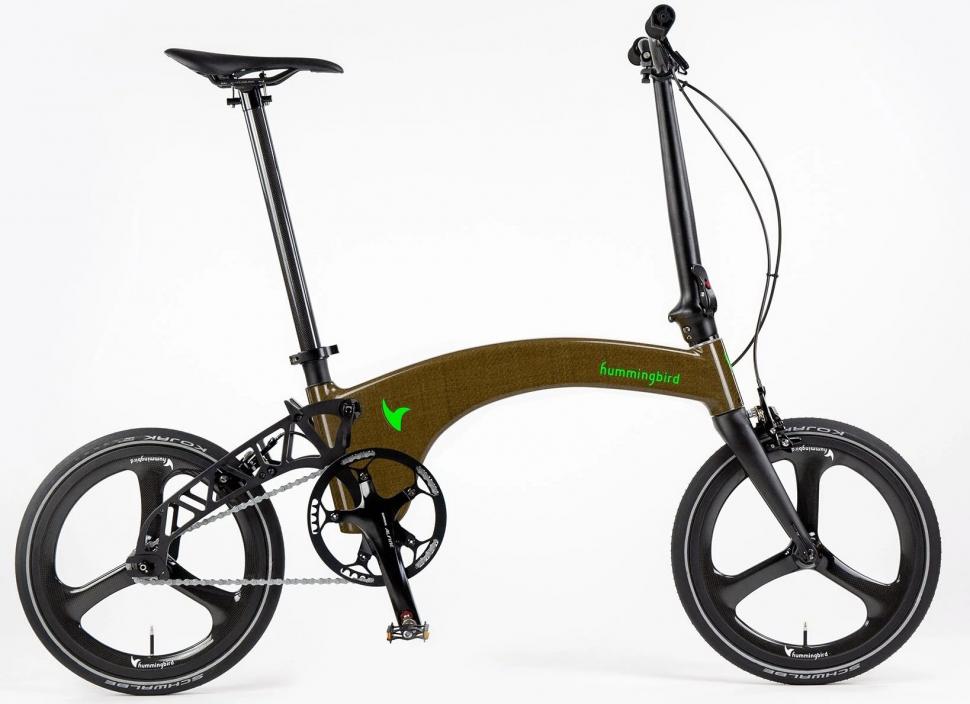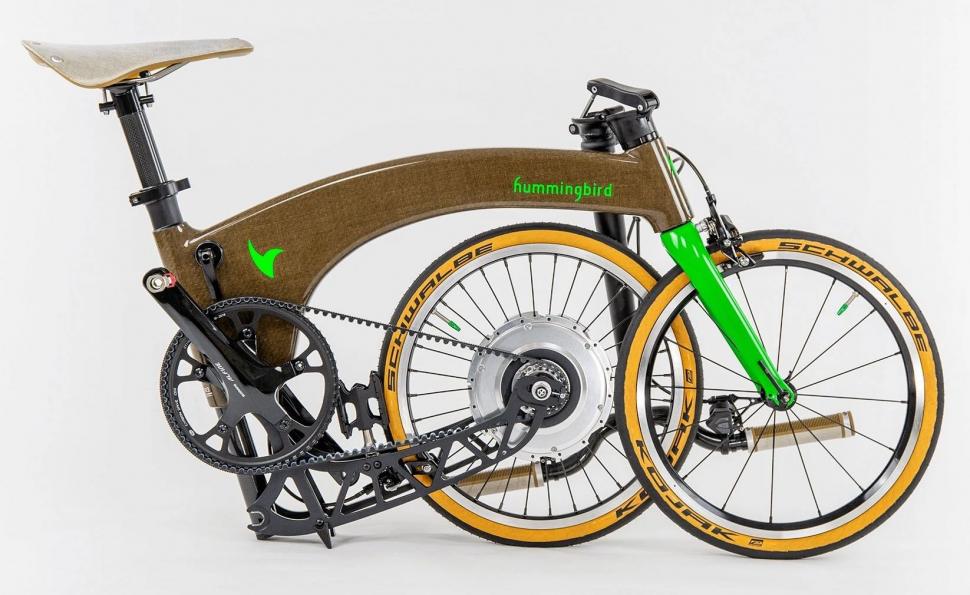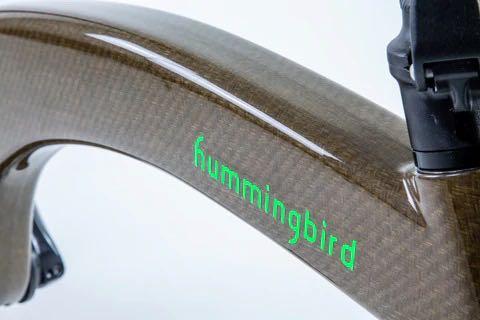- News
- Reviews
- Bikes
- Components
- Bar tape & grips
- Bottom brackets
- Brake & gear cables
- Brake & STI levers
- Brake pads & spares
- Brakes
- Cassettes & freewheels
- Chains
- Chainsets & chainrings
- Derailleurs - front
- Derailleurs - rear
- Forks
- Gear levers & shifters
- Groupsets
- Handlebars & extensions
- Headsets
- Hubs
- Inner tubes
- Pedals
- Quick releases & skewers
- Saddles
- Seatposts
- Stems
- Wheels
- Tyres
- Tubeless valves
- Accessories
- Accessories - misc
- Computer mounts
- Bags
- Bar ends
- Bike bags & cases
- Bottle cages
- Bottles
- Cameras
- Car racks
- Child seats
- Computers
- Glasses
- GPS units
- Helmets
- Lights - front
- Lights - rear
- Lights - sets
- Locks
- Mirrors
- Mudguards
- Racks
- Pumps & CO2 inflators
- Puncture kits
- Reflectives
- Smart watches
- Stands and racks
- Trailers
- Clothing
- Health, fitness and nutrition
- Tools and workshop
- Miscellaneous
- Buyers Guides
- Features
- Forum
- Recommends
- Podcast
TECH NEWS
 2022 Hummingbird flax folder - 2.jpeg
2022 Hummingbird flax folder - 2.jpegFlax appeal: check out “the world's lightest sustainable folding bike” from Hummingbird made from flax fibres
Hummingbird has created what it claims is the world’s lightest sustainable folding bike, made from flax plant fibres.
The brand says that the flax model matches the weight and strength of its carbon fibre predecessor. The flax frame is available built up into single speed, multi-speed, and electric bikes. It’s the single speed model that weighs a reported 6.9kg. To give that some perspective, Brompton revealed its lightest bike ever earlier this year, that titanium model coming in at a claimed 7.45kg.
Brompton drops its ‘lightest bike ever’: new 7.45kg titanium version of iconic folding bike revealed
“Flax fibre is a plant-based material capable of being just as light and strong as carbon fibre,” says Hummingbird. “Already being used in the motorsport industry as an alternative to carbon fibre, flax is lighter than carbon and offers improved vibration damping. Like the carbon fibre range, the new flax model passed ISO standards with flying colours after being put through the industry’s rigorous stress tests.
“Flax is also a sustainable material, unlike carbon fibre, as the waste generated at the production stage is biodegradable. Flax is far less harmful to dispose of and recycle than carbon as it will break down.”
Motorsport company Prodrive helped engineer and build the frame.
“Most composites are still made with synthetic fibres, which are very energy-consuming to produce, but natural fibres are grown, not made, and the energy requirements to turn the grown fibres into a useful reinforcement for composites can be considerably less than that required to produce a synthetic fibre,” said Prodrive’s Director of Business Development Matt Bradney.
Check out our review of the £450 Carrera Intercity Disc 9-speed folding bike
“Flax is the current predominant fibre in natural composites, with very good fibre and mechanical properties. There is a well-established infrastructure for producing flax fibres, which are also used for other sectors, such as the production of linen.”
Flax has been used in the bike industry for a long time. Museeuw started producing flax bikes in 2007, for example, and we reported that Schwinn had produced a flax concept bike back in 2008.
The 6 best folding bikes for 2022
We told you about a flax helmet in 2013 and Look launched its 765 endurance bike with flax fibres in key areas in 2015. The use of flax was designed to damp vibration.
Hummingbird says that its bike is the world’s first folder with a frame made entirely of flax fibres. You can see the woven flax through the clear finish.
The single speed version – with a carbon tri-spoke mag wheelset – is priced at £3,995, while the 8-speed model – with a Shimano Nexus hub gear – is £4,245 (or £4,445 with a belt drive).
There’s also an electric model with a 250W motor and built-in battery. This one is priced at £4,995.
Each model comes with a full carbon handlebar and seatpost.
Mat has been in cycling media since 1996, on titles including BikeRadar, Total Bike, Total Mountain Bike, What Mountain Bike and Mountain Biking UK, and he has been editor of 220 Triathlon and Cycling Plus. Mat has been road.cc technical editor for over a decade, testing bikes, fettling the latest kit, and trying out the most up-to-the-minute clothing. He has won his category in Ironman UK 70.3 and finished on the podium in both marathons he has run. Mat is a Cambridge graduate who did a post-grad in magazine journalism, and he is a winner of the Cycling Media Award for Specialist Online Writer. Now over 50, he's riding road and gravel bikes most days for fun and fitness rather than training for competitions.
Latest Comments
- ErnieC 5 min 15 sec ago
Good man, well done!
- bluezurich 45 min 23 sec ago
I watched it all on Tiz for free with no ads.
- David9694 5 hours 56 min ago
+1 on saddle height and also check your lateral alignment - everything should be straight and aligned. My bike fit years ago moved my feet to the...
- froze 6 hours 23 sec ago
Everything Lezyne sells are really good, especially their pumps, and the Torque Drive. ...
- wtjs 6 hours 44 min ago
It's not only the UK which suffers from vile louts-VdP is a great athlete who deserves respect!
- Hirsute 7 hours 19 min ago
https://www.youtube.com/watch?v=wOzP87HVCWw
- Rendel Harris 8 hours 46 min ago
Apart from the fact that you're completely wrong - Decathlon is a French company and has 1045 stores in Europe compared to 50 in the UK - whilst...
- hawkinspeter 10 hours 51 min ago
Finally tried out the Smart Lever that I did get for Xmas as I had a suspicious looking bubble/bump on my rear GoodYear tyre (don't think I'll buy...
- pockstone 11 hours 17 min ago
Suitable reply, No Reply.
- chrisonabike 13 hours 54 min ago
Further motoring exemptions have been highlighted by a certain celebrity lawyer: needing the loo, being a well-known footballer...


Add new comment
10 comments
What we should have is some kind of recycling tax applied to manufacturers that varies according to how expensive it is to recycle whatever they produce. That way, they'd be encouraged to pass the cost onto the consumer (another manufacturer or end-user) and the money raised should go to recycling facilities. That way, even if a manufacturer goes out of business, they can't skip the costs of recycling what they make.
Hopefully it would also get food companies to step up their game and simplify their packaging (e.g. apples in a pack would be recycle taxed, but not the same apples sold loose).
Sounds like road.cc would be due a rebate on some of their articles then!
The greeness of the flax counts for very little, it's part of a composite, always difficult to recycle, and the epoxy is impossible.
Same with bamboo bikes.
Steel seems much easier, and ali. Problems with Ti, at work we tried to get rid of our ultra speed ti centrifuge rotors, hit their expiry date. Recyclers wouldn't take them, need to analyse and so not worth it for a couple of kgs.
I thought bamboo underpants would be the thing, but the manufacturing process is resource intensive and in the end you still have viscose which not reusable and not readily biodegradable.
£4,995. - sheesh. Just bought a decent used car for less than that recently.
"Flax is far less harmful to dispose of and recycle than carbon as it will break down.”
Ah good, just what I look for in a bike, it's biodegradable...
Oh, for the love of God... Until these things have got a much bigger track record of lasting for a seriously long time without losing any strength, I'm staying well clear.
It's just a shame my two Ti road bikes and my steel Brommie have such limited lifespans. Oh...Wait....
Makes you wonder how sustainable the flax is compared to the Ti or even the plain old steel brommy.
Yeah as much as it's cool that it's super light, you've got to wonder how much better than carbon fibre it really is, surely the resin that bonds the fibres together is going to be similar and isn't great for the environment? Metal bikes are almost endlessly recyclable, sometimes I think the industry forgets that when it's trying to sell us the newest wonder material bike.
Exactly, the resin is the real problem here. Calling the whole thing "sustainable" is pure greenwashing.
I'd love one of those (with gears obvs).. bit ouchy on the price for me though.